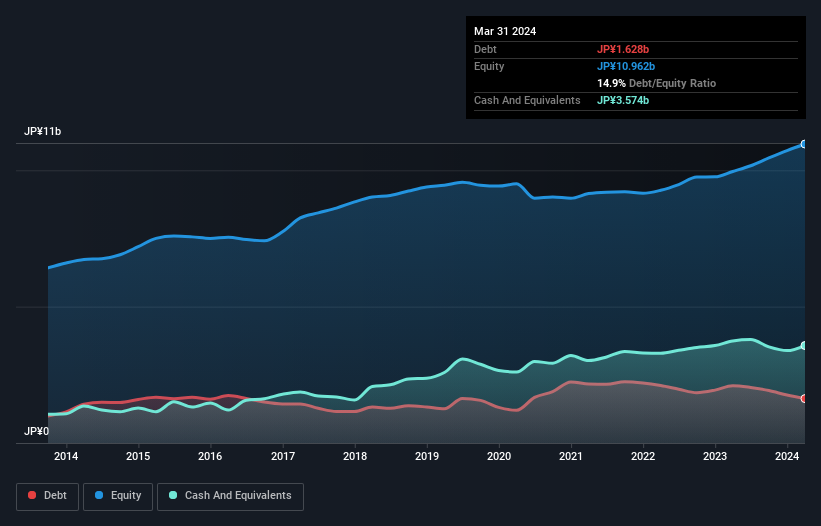- Japan
- /
- Auto Components
- /
- TSE:7208
These 4 Measures Indicate That Kanemitsu (TSE:7208) Is Using Debt Safely

David Iben put it well when he said, 'Volatility is not a risk we care about. What we care about is avoiding the permanent loss of capital.' It's only natural to consider a company's balance sheet when you examine how risky it is, since debt is often involved when a business collapses. As with many other companies Kanemitsu Corporation (TSE:7208) makes use of debt. But the real question is whether this debt is making the company risky.
What Risk Does Debt Bring?
Generally speaking, debt only becomes a real problem when a company can't easily pay it off, either by raising capital or with its own cash flow. If things get really bad, the lenders can take control of the business. While that is not too common, we often do see indebted companies permanently diluting shareholders because lenders force them to raise capital at a distressed price. Of course, debt can be an important tool in businesses, particularly capital heavy businesses. The first step when considering a company's debt levels is to consider its cash and debt together.
See our latest analysis for Kanemitsu
What Is Kanemitsu's Net Debt?
As you can see below, Kanemitsu had JP¥1.63b of debt at March 2024, down from JP¥2.10b a year prior. However, its balance sheet shows it holds JP¥3.57b in cash, so it actually has JP¥1.95b net cash.

A Look At Kanemitsu's Liabilities
We can see from the most recent balance sheet that Kanemitsu had liabilities of JP¥3.66b falling due within a year, and liabilities of JP¥1.49b due beyond that. On the other hand, it had cash of JP¥3.57b and JP¥3.18b worth of receivables due within a year. So it actually has JP¥1.61b more liquid assets than total liabilities.
This surplus strongly suggests that Kanemitsu has a rock-solid balance sheet (and the debt is of no concern whatsoever). On this view, lenders should feel as safe as the beloved of a black-belt karate master. Succinctly put, Kanemitsu boasts net cash, so it's fair to say it does not have a heavy debt load!
On top of that, Kanemitsu grew its EBIT by 35% over the last twelve months, and that growth will make it easier to handle its debt. The balance sheet is clearly the area to focus on when you are analysing debt. But it is Kanemitsu's earnings that will influence how the balance sheet holds up in the future. So if you're keen to discover more about its earnings, it might be worth checking out this graph of its long term earnings trend.
Finally, a business needs free cash flow to pay off debt; accounting profits just don't cut it. Kanemitsu may have net cash on the balance sheet, but it is still interesting to look at how well the business converts its earnings before interest and tax (EBIT) to free cash flow, because that will influence both its need for, and its capacity to manage debt. Over the last three years, Kanemitsu actually produced more free cash flow than EBIT. That sort of strong cash generation warms our hearts like a puppy in a bumblebee suit.
Summing Up
While we empathize with investors who find debt concerning, you should keep in mind that Kanemitsu has net cash of JP¥1.95b, as well as more liquid assets than liabilities. The cherry on top was that in converted 108% of that EBIT to free cash flow, bringing in JP¥431m. The bottom line is that Kanemitsu's use of debt is absolutely fine. There's no doubt that we learn most about debt from the balance sheet. However, not all investment risk resides within the balance sheet - far from it. For example - Kanemitsu has 1 warning sign we think you should be aware of.
If, after all that, you're more interested in a fast growing company with a rock-solid balance sheet, then check out our list of net cash growth stocks without delay.
Valuation is complex, but we're here to simplify it.
Discover if Kanemitsu might be undervalued or overvalued with our detailed analysis, featuring fair value estimates, potential risks, dividends, insider trades, and its financial condition.
Access Free AnalysisHave feedback on this article? Concerned about the content? Get in touch with us directly. Alternatively, email editorial-team (at) simplywallst.com.
This article by Simply Wall St is general in nature. We provide commentary based on historical data and analyst forecasts only using an unbiased methodology and our articles are not intended to be financial advice. It does not constitute a recommendation to buy or sell any stock, and does not take account of your objectives, or your financial situation. We aim to bring you long-term focused analysis driven by fundamental data. Note that our analysis may not factor in the latest price-sensitive company announcements or qualitative material. Simply Wall St has no position in any stocks mentioned.
Have feedback on this article? Concerned about the content? Get in touch with us directly. Alternatively, email editorial-team@simplywallst.com
About TSE:7208
Kanemitsu
Engages in the development, manufacture, and sale of pulleys for automobiles, and agricultural machinery and three-dimensional steel plates in Japan.
Flawless balance sheet established dividend payer.
Market Insights
Community Narratives



